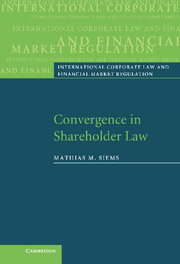Book contents
- Frontmatter
- Contents
- Preface and acknowledgments
- List of abbreviations
- Table of cases
- Table of legislation
- Introduction
- PART I The object and course of the investigation
- PART II The status quo of convergence
- 2 Legal bases
- 3 Bases for a shareholder typology
- 4 The ‘shareholder as such’
- 5 The shareholder in the power structure of the company
- 6 Conclusions to Part II
- PART III Developmental trends and patterns
- PART IV Conclusion
- References
- Index
2 - Legal bases
Published online by Cambridge University Press: 15 December 2009
- Frontmatter
- Contents
- Preface and acknowledgments
- List of abbreviations
- Table of cases
- Table of legislation
- Introduction
- PART I The object and course of the investigation
- PART II The status quo of convergence
- 2 Legal bases
- 3 Bases for a shareholder typology
- 4 The ‘shareholder as such’
- 5 The shareholder in the power structure of the company
- 6 Conclusions to Part II
- PART III Developmental trends and patterns
- PART IV Conclusion
- References
- Index
Summary
The ‘globalization’ of the economy could encourage particular legal bases. It might intuitively be thought that, for complex global problems, international law (rather than regional law) and statute law (rather than case) law would be of importance (sections I and II below). Additionally, securities law (rather than company law) and self-regulation (rather than state regulation) might grow in weight (sections III and IV below), since globalization is driven above all by the capital markets and private actors (enterprises, lawyers, auditors, NGOs etc.). Looking at present-day law more closely, however, it is apparent that, while there is more mixing of legal bases, no substitution of one legal basis for another is coming about. Furthermore, similar basic patterns can be discerned in the individual countries. Yet, the remaining differences have also to be taken into account, since they may affect shareholder law in substance.
International and regional law
International and regional law are not diametrically opposed in shareholder law. Since international law prescribes no harmonization of shareholder law, it is instead left more to regional (or national) law to set mandatory standards.
International law
Although there are no uniformly binding regulations directly regulating the rights of shareholders internationally, international law is nonetheless not irrelevant to the legal position of shareholders. First, liberalizations of world trade and the international capital market may have effects for the future rights of shareholders. Secondly, non-binding international standards contribute to a certain internationalization of law. This is particularly the case for the OECD Principles of Corporate Governance.
- Type
- Chapter
- Information
- Convergence in Shareholder Law , pp. 31 - 59Publisher: Cambridge University PressPrint publication year: 2007

